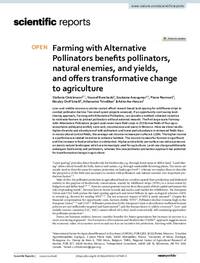Farming with Alternative Pollinators benefits pollinators, natural enemies, and yields, and offers transformative change to agriculture

Authors:
Low- and middle-income countries cannot afford reward-based land sparing for wildflower strips to combat pollinator decline. Two small-grant projects assessed, if an opportunity-cost saving land-sharing approach, Farming with Alternative Pollinators, can provide a method-inherent incentive to motivate farmers to protect pollinators without external rewards. The first large-scale Farming-with-Alternative-Pollinators project used seven main field crops in 233 farmer fields of four agro-ecosystems (adequate rainfall, semi-arid, mountainous and oasis) in Morocco. Here we show results: higher diversity and abundance of wild pollinators and lower pest abundance in enhanced fields than in monocultural control fields; the average net-income increase per surface is 121%. The higher income is a performance-related incentive to enhance habitats. The income increase for farmers is significant and the increase in food production is substantial. Higher productivity per surface can reduce pressure on (semi)-natural landscapes which are increasingly used for agriculture. Land-use change additionally endangers biodiversity and pollinators, whereas this new pollinator-protection approach has potential for transformative change in agriculture.
